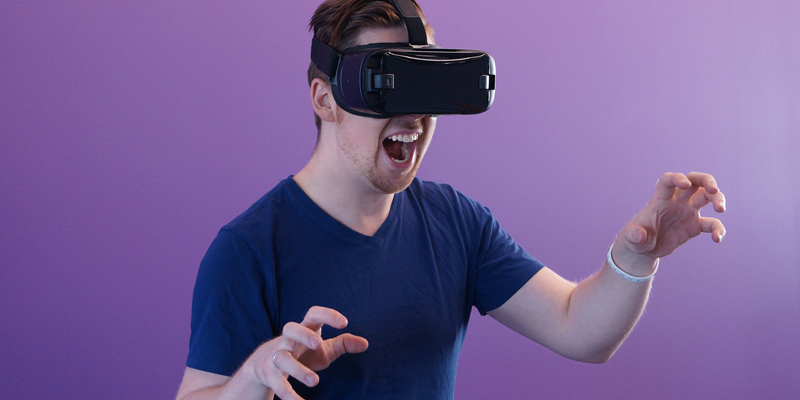Bett will once again be returning to ExCeL London from 23-26 January 2019, giving educators the opportunity to hear from inspirational speakers, find practical edtech solutions for teaching and learning and share best-practice.
From 21st century skills and neurodiversity to exceptional pedagogy and classroom resources, Bett will showcase the latest education trends, innovations and resources, and bring to life all the skills that learners today will need in order to thrive tomorrow.
During the four-day event, hundreds of exhibitors offer educators the opportunity to get hands-on and trial and test the latest products and solutions that have been designed to combat the sector’s challenges and take teaching and learning to the next level.
Ahead of the show, we spoke to a handful of exhibitors to find out what trends and challenges we’re likely to see over the next year and how edtech can help to transform and support education in 2019. Here is what they said…

What trends are we likely to see at the show?
Ricky Ye, chief executive officer for DFRobot (stand C413): “Greater emphasis continues to be placed on integrating hands-on STEM resources into classrooms, so I anticipate seeing more resources that promote this type of learning. School budgets continue to remain tight and subsequently, resources that can be scaled up will be popular. It is important that edtech resources continue to provide learning opportunities for students as their knowledge and abilities expand”.
Anthony Coxon, co-founder of GCSEPod (stand B114): “There is likely to be a lot of focus on artificial intelligence (AI); the new kid on the block - although it has been around for some time. Unfortunately, although a nice to have, the proof will be in the pudding as to whether there is any hard evidence of impact on results and attainment”.
Dave Grosvenor, education programme manager at Learning by Questions (LbQ) (stand F160): “Over the years Bett has seen technology trends come and go, particularly those focused on hands-on learning – think panels, robots, and VR glasses. However, short term engagement is not synonymous with long term learning. This year, we think edtech trends will revolve around how these resources can empower teachers. Teachers shouldn’t have to learn tech to teach and these resources should help ease their workload, not add to it. We anticipate that this shift to focus on teachers’ well-being will be a welcome change across the board!”
Craig Scott, VP of technology at ViewSonic (stand D180): “This year we are likely to see solutions that will focus on increasing student engagement. We foresee that the Internet of Things (IoT) integration for data collection and AI/machine learning will be popular. However, while data is key, without proper analysis and the tools to evaluate impact, it will be meaningless. Therefore, we should start seeing more intelligent resources that will help educators create meaningful analysis in order to increase teacher/student engagement and overall attainment.
Sam Warnes, former teacher and founder of EDLounge (stand E170): “Virtual reality (VR) is going to be the big one! I believe we’re going to see it become more and more incorporated into the curriculum to support learning through immersive environments. Our development plan for 2019 is to ensure that English, maths and science can be taught more functionally and in smaller chunks via the virtual classroom so that these topics are better understood by students”.
Karen Bierde, head of strategic growth for Kognity (stand F72): “Poor implementation is the number one reason that EdTech products fail to have an impact in schools, according to a recent study. Hopefully both the buyers (schools) and the EdTech providers will start to take this seriously, with it being a core part of a purchase process! Focus on challenges for teachers and students (workload and wellbeing) will likely continue, whilst budgets remain low. Effective tools which help alleviate these challenges will likely gain traction in schools”.
Preben Hasen, chief commercial officer at KUBO Robotics (stand F70/F71): “While having a number of coding resources at the show isn’t dissimilar to previous years, we’re starting to see a shift in the way STEM learning is positioned in the classroom. Rather than simply providing resources to engage pupils in STEM subjects, we’re seeing a greater focus on the importance of how to understand and communicate with technology and demonstrate to children the purpose of what they are learning.
“That doesn’t necessarily mean the latest and greatest gadgets either! Screen-free solutions can be just as effective, if not more so, when teaching and learning how to code. Not only does it create a more playful, hands-on way of learning for children, it also makes it easy for teachers of all disciplines to introduce computer science and coding into their daily teaching activities in a simple and engaging way”.

What challenges will the education sector face this year?
Ricky, DFRobot: “I think that one of the main challenges for schools and teachers over the next year will be finding ways to include hands-on STEM learning into the classroom. Many assessment methods continue to be written exams however, subjects like computing don’t fit neatly into this traditional model. Educators will need to continue to advocate for hands-on and real-life learning and assessment methodologies”.
Anthony, GCSEPod: “There is nothing more frightening than the very real horror story of funding in education. So, some might say that now is not the time to be spending on Ed Tech, but for those SLT’s in the know, quite the opposite is true, as they realise that for maximum impact, with modest outlay, embedding the right technologies with supporting content within the teaching framework might very well save the day, bringing positivity, reducing workload and workplace stress”.
Dave, LbQ: “Over the past 20 years the edtech market has become busier than ever. I think one of the main challenges schools and teachers will face in 2019 is being able to make informed choices about what will solve the problems that exist in their environments. It’s becoming increasingly important to use evidence to determine which resources will provide effective support and allow teachers to focus on what they do best – nurturing learning”.
Craig, ViewSonic: “One of the key challenges we believe that edtech vendors, educators and students face is the increase in complexity and multitude of edtech apps, tools, and products; there are so many solutions available it’s hard to identify which ones will provide schools with the best outcome that suits the needs of every student. The key question from teachers will be to distinguish exactly how edtech will aid their teaching methods, rather than adding to workloads”.
Sam, EDLounge: “I believe the main challenge will stem from teachers’ workload: ensuring that teachers are as upskilled and knowledgeable as they can be when it comes to technology will be a challenge because so many of them simply won’t have the time to practice using technology. Today’s students are millennials; they gravitate towards technology and have a natural affinity for it. If their teachers don’t have the technological knowledge to answer their questions or challenge them, how can they keep them engaged with the subject?”
Karen, Kognity: “Schools still do not have a holistic view of what a digital strategy entails. It is not simply having a computer lab or a 3D printer and hoping that it yields results. Rather, a school needs to see it in a much wider context - how does the technology work with the current ecosystem, how does it fit into a teacher's pedagogy, how do we ensure we have systems or products that complement each other?”
Preben, KUBO Robotics: “With the increasing number of new resources appearing in the market, it remains difficult for schools and teachers to identify the right resources and tools that will make an impact on teaching and learning. Educators should look for technology resources that have longevity in terms of meeting curriculum demands and should try to avoid fads. For example, learning to code is a foundational skill that, once grasped, can be applied to many aspects of technology”.

And finally, how can edtech help transform and support education?
Ricky, DFRobot: “Effective edtech helps bridge the gap between theoretical knowledge and practical applications. These hands-on resources encourage teachers to find more creative ways to teach curriculum that also impart soft skills such as problem-solving and collaborative work and can help transform the learning experience for students”.
Anthony, GCSEPod: “Edtech is streamlining the workload for teachers, providing them with automated and instant data and analytics; which are becoming ever more necessary to prove and drive outcomes in learning. Due to educators often having to wear more than one hat and teach outside their specialism, it is becoming ever more important to build confidence within the faculty and give them the tools they need to carry out these duties with confidence and be assured the content is there so no time is wasted”.
Dave, LbQ: “Edtech should be used as a tool to enhance pedagogy. I believe edtech should be re-coined as pedtech; it should offer holistic solutions that put teachers first and illuminate learning. After all, products are what people buy, solutions are what people want”.
Craig, ViewSonic: “The ‘scale-up’ concept, also known as problem-based learning can help encourage student engagement. This concept helps teachers assume the role of facilitator, encouraging students to take a more active role in their learning. Edtech which offers more open and cross-platform solutions, will give educators more flexibility and creativity when it comes to teaching and lesson planning”.
Karen, Kognity: “Technology is often viewed with deep scepticism from the educational world, and it is important to nuance this. Technology is neither a threat nor a saviour in education. Rather, when correctly designed, it should be an enabler of improving the existing ecosystem, by enhancing the role of the teacher and simplifying differentiation of teaching based on each student's needs”.
Preben, KUBO Robotics: “Using technology that supports “adaptive learning”, for instance, artificial intelligence, will mean that teachers can gather data that not only demonstrates how individuals are learning, but also identifies the gaps in a student’s understanding. This information can then be used by teachers to effectively and efficiently tailor programmes of learning to individual needs”.
For more information about the show or to register to attend, visit: www.bettshow.com
Want to receive cutting-edge insights from leading educators each week? Sign up to our Community Update and be part of the action!


















